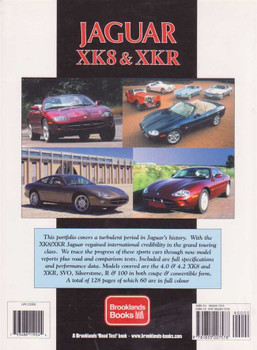Description
By Colin Howard, Softbound, 70 Pages, ISBN: 9780957666412, First Published - 2013
Although the Jaguar XK8 was launched amid much publicity at the Geneva Motor Show in March 1996 it was not until the autumn of 1996 that cars reached their customers. And in the U.S.A. the first cars were not delivered until the start of 1997. The Jaguar XJS came to the end of its 21 year production run at Browns Lane in April 1996.
Twenty 'pilot build' Jaguar XK8's had been made on the regular assembly lines in 1995. This included 8 Jaguar XK8 Coupes and 12 Jaguar Convertibles. Real volume production of the Jaguar XK8 began in June 1996.
The assembly lines for the Jaguar XK8 were at Browns Lane while the bodies were to be built at Castle Bromwich. Although not long there was a gap between the end of the old Jaguar XJS and the start of the new XK8 being assembled.
Production, delivery and assembly of the Jaguar XK8 was always going to be more complicated that it had been with the Jaguar XJS. Engines of the XJS had been manufactured at Radford which was only a few miles away
from Browns Lane.
Ford's decision to centralize corporate engine production meant the Jaguar XK8 took shape in a very different way. For the first time the cars were to be powered by engines that had not been made in Coventry. Steel and aluminium pressings that made up the body shell would be made at Jaguar's existing Castle Bromwich factory. They were then welded together and painted and then taken to Browns Lane by truck. They were then ready to join the assembly lines where the shells of Jaguar XJ saloons had made the same journey. The assembly line at Castle Bromwich was a complex and expensive installation. V8 engines were manufactured at Ford's Bridgend plant in South Wales and taken by truck to Brown's Lane. Five speed automatic transmissions (2F) were made at Friedrichshafen, Germany and taken across Europe to Browns Lane. Browns Lane became more of an assembly than a manufacturing complex.One notable feature of the XK8 was that all previous Jaguars had had bumpers, but the Jaguar XK8 did not.At the time around the launch of the Jaguar XK8, Autocar magazine published a comparison test of the Jaguar XK8. It was tested alongside a BMW 840Ci, Aston Martin DB7 Coupe and a W129 series Mercedes Benz SL500. What was noticeable was that the price of the Aston Martin DB7 was £82,500, the Mercedes Benz SL500 was £78,950, the BMW 840 Ci was £56,850 whilst the Jaguar XK8 was just £47,950.
Admittedly this was without many expensive options, such as full leather upholstery (21415) or cruise control (2380). An upgrade to the sound system was also available at a cost of an amazing 21190. Autocar's testers at the time stated: `The XK8 was worth the wait, worth those thousands of miles spent perfecting the ride in America, the sub-zero testing in Lapland, the arguments over its styling that aged for months anywhere from Cologne to Coventry. It is a truly accomplished GT car, in many says a more convincing product ran the considerably pricier DB7 tat proved so influential during is conception and execution. For starters, it has one of the very best power-trains we've driven at any price. The seamless way in which the five-speed automatic gearbox blends with the 4-litre V8 to carry you so immediately, yet so serenely down the road, remains an experience of rare quality even by today's lofty standards. And he unusually broad vocabulary of the chassis serves only to heighten the respect we harbour for this car on a dynamic level. It is, first and foremost, a cracking good car to drive, which is to say nothing of the way it looks, the surprising refinement and economy of its AJV8 engine, or the exquisite fit and finish of the body, which features some of the classiest paint and tightest, most consistent panel gaps of any car."





















